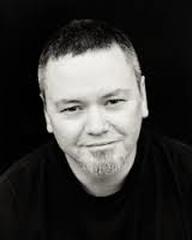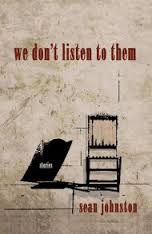 I met Sean Johnston when he moved into an adjoining cubicle at Okanagan College, where we teach. I read his novel All This Town Remembers soon after, and quickly realized I was cube-sharing with a genius (he won the Saskatchewan Book Award, for one thing). We sometimes gave each other writing prompts and workshopped stories before young children took over our lives (ahem, he neglects to mention that the possible title We Don't Celebrate That came from me). Despite historical fiction not really being his thing, Sean gamely read part of an early draft of All True for me, and commented that Daniel would have been better off with a cell phone. In his version, I'm certain there would be cell phones in early frontier Kentucky. I always feel lucky reading Sean's work, poetry or fiction, draft or finished. It makes me think differently. It's unconcerned with keeping up a line between reality and fiction, and it is often happy to comment on itself from within. It bends the genre, but never shows off. Guy Vanderhaege calls him "a writer to watch." His latest short story collection, We Don't Listen to Them, is full of outstanding stories, which I asked him about here. 1. Did you have any alternate titles for your book? What made you pick We Don't Listen to Them? Did that come to you fully formed at the start, or later? I considered a number of titles. I am never quite sure with collections. Novels are easier to name, I think, but this one was called at various times A Long Day inside the Buildings, We Don’t Celebrate That, Big Books Shut. All the titles I considered came from three of the stories, which seemed to be about a similar thing, but in the end I didn’t want to use one of their titles, so I chose a line from the story “Big Books Shut,” which seems okay, but still not perfect. Those stories are about the small gestures humans may make in defiance of invisible authority and the indifference with which those gestures are met, and that’s in the title. 2. Which story did you write first? How did you decide where to place it within the collection? “A Long Day Inside the Buildings” was written first, but around the same time as “It Cools Down.” They both come later in the collection because they seem a little quieter than the others. In the first case, for instance, nobody dies, though a boy loses his foot. The stories that complement that one come earlier, and there is more violence in them, though it’s less directly treated in ways. 3. How did you know the book was done (especially weird with a short-story collection)? I never know that with a collection of stories. I never write stories or poems with a book in mind and I kind of regret having to put them into this artificial order. I like stories on their own as a reader too, so what happens usually has less to do with the stories in the collection and more to do with what I am writing at the time – if I find, as I did in this case, that I just wasn’t writing new stories, then I look back and collect what has happened until then. It seems like with this one I was just working on a novel whenever I sat down to write, and had no more stories in me for a while. 4. Could you choose a piece of music to go with your book, or with a particular story? I remember driving at night in my $800 Ford Econoline van to New Brunswick to start my MA. I had a little cigarillo, nobody else was on the highway, and one of Steve Earle’s sad leaving-town songs was on the radio, and I kind of wrote “It Cools Down” as I drove. Any of his songs, really, but especially the one that has the words “I thought I might see the first light of a new day / as it lay like fool’s gold on the ground.” 5. Your characters are often powerless or attempting to take power. Can you talk about that? I don’t know anything else to write about, really. Wilt Chamberlain said nobody cheers for Goliath, and I think that’s true. It’s the classic problem: the world does not treat you as you would like to be treated. The world is not the world you want, and you want something else. But it’s more than that, I guess. The most compelling thing about any character, to me, real or imagined, is how they remain human despite the abuse and neglect and poverty, or whatever might happen to them. A student of mine once wrote an amazing story in a second year class. He wasn’t the strongest writer, but his subject was by far the most compelling. His story was about a man who dreamed of a union job driving a truck at the local mine. That’s the kind of thing that interests me. It was real. I have been in that position where just getting a job as a labourer makes you feel like you’ve won the lottery, and not because you can get a new car, but because you have enough to buy a battery for the old one. That kind of thing. 6. "He Hasn't Been to the Bank in Weeks" describes a man dressing his dead wife for her funeral. Physical descriptions--bodies--in your work are usually subtle but important. Can you talk about how you see your characters this way? I try to limit the description and provide just enough for the reader to imagine it fully. For characters and their bodies what’s important to me is where they contact the world – the gestures they make and the comfort or discomfort they feel. I hope it’s done subtly, where what little is said is a signal, because the danger is probably that movie kind of lie, where the wacky character is shown to be wacky by wearing a crazy hat or not combing their hair, etc. Or the way Brad Pitt seems to think eating while he speaks makes his character seem complex? It’s hard when there is little description, but then in short fiction I just think you don’t have the time. Maybe in novels. I don’t want to be Sherwood Anderson, say, who seems to set everything up with a short fat man vs. a long skinny one. 7. These stories aren't always obviously linked, but they frequently tread a line between the realistic and the bizarre, sometimes leaping right off that edge. Does that happen naturally when you're writing a straightforward piece? It’s funny you say that, because so often I am wrong about which parts are realistic and which are not. I wrote, for instance, “We Don’t Celebrate That,” about Canada in the near future, where there was no freedom for writers, but there were government jobs. This isn’t really far-fetched, of course – writers spin things for governments and businesses all the time – but now I feel like it’s actually just reality, but I made a mistake and should have written about scientists being muzzled and intelligence and science being attacked in general. I could have had a nice realistic picture of our country under Harper, but I wrote it about 6 or 7 years ago and I didn’t want to be ridiculous. We kind of live in a world right now where I don’t think anything I have written that was meant to be absurd seems unbelievable anymore.
0 Comments
Leave a Reply. |
ALIX HAWLEYI'm the author of My Name is a Knife, All True Not a Lie In It, and The Old Familiar. Archives
February 2021
Categories |

 RSS Feed
RSS Feed
